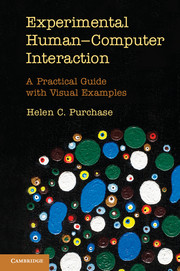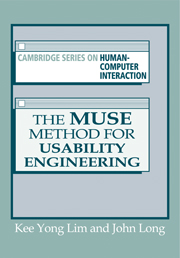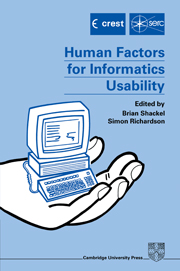Experimental Human-Computer Interaction
Experiments that require the use of human participants are time consuming and costly: it is important to get the process right the first time. Planning and preparation are key to success. This practical book takes the human-computer interaction researcher through the complete experimental process, from identifying a research question to designing and conducting an experiment, and then to analyzing and reporting the results.
The advice offered in this book draws on the author's twenty years of experience running experiments. In describing general concepts of experimental design and analysis she refers to numerous worked examples that address the very real practicalities and problems of conducting an experiment, such as managing participants, getting ethical approval, preempting criticism, choosing a statistical method, and dealing with unexpected events.
- Presents a step-by-step approach, from research idea to publication, for experimental design using a practical and concrete approach
- Discusses at least 21 real research experiments, together with illustrations and, where appropriate, the actual data collected and/or the results reported
- Offers a detailed description of the most important statistical methods required, with complete illustrations as to how they should be applied
Reviews & endorsements
“Helen Purchase is a leading expert in computer science and this book reflects her considerable experience in the field. It gives practical, case study lead guidance on performing user studies in HCI, covering experimental design, procedure, and analysis. It contains useful advice on best practices as well as covering potential pitfalls when conducting these experiments. Dr. Purchase has produced an accessible guide that is a recommended read for anyone performing studies on how humans interact with computers.”
GPeter Rodgers, University of Kent
“This is an excellent primer for beginning researchers in HCI-related topics who need to undertake experiments and/or evaluations as part of their research activity. The example-based approach and clear no-nonsense style of writing make it a very readable text. This is not a book that will sit on your shelf, it will be used and referred to often – it will be mandatory reading for my commencing research students.”
GJohn Hosking, Australian National University
“Helen Purchase's new book is a practical guide to HCI experiments. It is essential reading for designers of human interfaces to computer systems, especially systems that create visualizations of data. The book is full of case studies from the personal experiences of the author.”
GPeter Eades, University of Sydney
“Experimental Human-Computer Interaction provides an excellent introduction to HCI research methodology and the possible pitfalls for HCI researchers. I highly recommend it to anyone who is thinking about conducting an HCI experiment, and I wish that we had had the chance to read it before I and my students conducted our first HCI experiments.”
GKim Marriott, Monash University
“Helen Purchase has written a book the literature was missing, covering all HCI and statistical aspects involved in conducting user experiments. Purchase's vivid style and pragmatism exploits well-grounded and illustrative examples based on the author's wide experience conducting user experiments in various research contexts.
The book follows the chronology of the design of an experiment, giving the user increasing confidence about his or her capability to address the evaluation questions related to his or her own research.
Issues are discussed in the exact right order and appropriate level of details, as if Purchase was standing behind the door listening to the next question you have. The pragmatic perspective borrowed by the author gives the reader an extremely positive feeling of increasing knowledge and know-how, inviting him or her to get on with the user experiment that has been waiting on the to-do list for so many years.”
Guy Melançon, Université de Bordeaux and INRIA Bordeaux – Sud-Ouest
Product details
July 2012Paperback
9780521279543
256 pages
228 × 152 × 13 mm
0.35kg
72 b/w illus. 67 tables
Available
Table of Contents
- 1. Introduction
- 2. Defining the research
- 3. Experimental procedure
- 4. Data collection and qualitative analysis
- 5. Statistics
- 6. Reporting
- 7. Problems and pitfalls
- 8. Six principles for conducting experiments
- Appendix 1. Independent measures examples
- Appendix 2. Statistical formulae
- Appendix 3. Factor analysis example.





